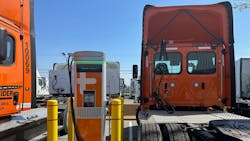Cummins, Daimler, Paccar partner on EV battery production
Daimler Truck, Paccar, and Cummins’ zero-emissions business unit, Accelera, have formed a joint venture to produce battery cells in the U.S. for commercial electric vehicles. The three companies announced in a release that their total investment will range from $2 billion to $3 billion for the 21 gigawatt-hour factory, .
Accelera, Daimler Truck, and Paccar will own 30% each of the venture and jointly control it. The venture will initially focus on lithium-iron-phosphate (LFP) batteries. LFP battery manufacturer EVE Energy will serve as a technology partner in the joint venture with 10% ownership and will contribute its battery cell design and manufacturing knowledge. In the joint release, they stated the LFP battery cells would offer several advantages over other battery components, such as lower cost, longer life, and improved safety, without the need for nickel and cobalt raw materials.
See also: Lightning eMotors CEO on battery supply chain difficulties
“We have the responsibility to decarbonize in a way that is best for all of our stakeholders and the planet. This requires working closely with key partners,” Cummins Chair and CEO Jennifer Rumsey said in the release. “Today’s announcement reflects that action. Not only are we advancing a key technology solution for our customers but accelerating the energy transition in the United States.”
Daimler Truck CEO Martin Daum added, “For Daimler Truck, partnerships and a strict focus on costs and smart capital allocation are the key levers to succeed on the path toward sustainable transportation. This planned joint venture enables economies of scale beyond Daimler Truck. It is a key puzzle piece of our battery industrialization strategy, ensuring access to the right battery cell technology at the right cost.”
Paccar CEO Preston Feight stated, “Our vision is the highest quality, locally produced battery technology to enhance the operations of our customers and help them achieve their operational and environmental goals.”
The three companies said in the release that they expect to see growing demand for battery technology throughout this decade and that U.S. customers should benefit from a state-of-the-art battery cell factory in the United States, but they did not specify a preferred location for the factory.
About the Author
FleetOwner Staff
Our Editorial Team
Kevin Jones, Editorial Director, Commercial Vehicle Group
Josh Fisher, Editor-in-Chief
Jade Brasher, Senior Editor
Jeremy Wolfe, Editor
Jenna Hume, Digital Editor
Eric Van Egeren, Art Director
